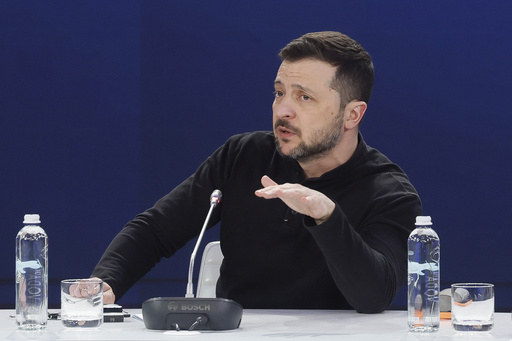KYIV, Ukraine — Leaders from twelve European countries and Canada have convened in Ukraine to commemorate the third anniversary of Russia’s invasion, engaging in discussions with President Volodymyr Zelenskyy on potential support. Notable attendees include the President of the European Commission, Ursula von der Leyen, and Canadian Prime Minister Justin Trudeau.
Under President Donald Trump, the United States’ stance regarding Russia and Ukraine is undergoing significant changes, raising questions about peace negotiations and Ukraine’s aspirations for membership in the European Union and NATO.
In the latest developments, the U.N. General Assembly recently rejected a U.S. resolution intended to end the conflict without addressing Russian aggression. The assembly modified the resolution, underscoring that Russia’s invasion constitutes a breach of the U.N. Charter. In a non-binding vote involving 193 member states, the result was 93 in favor, 8 against, and 73 abstaining, with Ukraine voting “yes” while the U.S. chose to abstain and Russia voted “no.” Furthermore, the Assembly passed a Ukrainian resolution calling for the immediate withdrawal of Russian forces, with a vote tally of 93-18 and 65 abstentions—the numbers reflecting a decline from earlier resolutions that saw broader condemnation of Russia’s actions.
The commitment of Northern European nations to train Ukrainian troops has also been announced. Norwegian Prime Minister Jonas Gahr Stoere revealed that seven Nordic and Baltic nations plan to train and equip a brigade of the Ukrainian army, comprising 3,000 to 5,000 soldiers while Norway pledges approximately $11.2 million to bolster the energy infrastructure of both Ukraine and Moldova.
Ursula von der Leyen has commended Ukraine’s strides towards joining the EU and hinted that membership could materialize before 2030 if the country continues on its current reform trajectory. However, the process is described as “merit-based,” emphasizing that Ukraine must maintain the pace and quality of its reforms.
Lithuanian Prime Minister Gitanas Nauseda has called for a discussion on European support for any peacekeeping forces stationed within Ukraine to maintain future peace agreements. He stressed the importance of a clear mandate for such forces and immediate, robust responses to any ceasefire violations.
In a virtual meeting of G7 leaders to address the ongoing conflict, Zelenskyy reached out to President Trump, expressing the concerns of Ukrainian families regarding ongoing American support. While relations between Kyiv and Washington have experienced tension under the Trump administration, Zelenskyy noted productive discussions regarding economic agreements surrounding Ukraine’s rare earth mineral resources. He also advocated for Ukraine’s NATO membership, which opposition is rooted in Trump’s administration’s stance.
Meanwhile, Finnish President Alexander Stubb has urged European nations to adopt a more proactive approach in formulating a strategy toward Ukraine. He remarked on the necessity for Europe to collectively unite in handling the evolving geopolitical landscape shaped by changing U.S leadership.
Zelenskyy expressed hope that the war could reach a conclusion within the current year, advocating for a security framework designed to deter further aggression. He envisioned that, if Ukraine secures its place in both the EU and NATO shortly, it could prevent future invasions.
Estonian Prime Minister Kristen Michal cautioned that any “unjust peace” settlement in Ukraine could have dire consequences for global security, as it might embolden aggressor states like Russia.
Ursula von der Leyen later indicated that discussions concerning sanctions relief for Russia would only commence once it demonstrates a commitment to pursuing peace with Western nations, asserting that punitive measures would be intensified should Russia fail to comply.
In a response to the ongoing crisis, the British government introduced new sanctions against 107 individuals and businesses, which they claim represent the largest sanction package aimed at Russia’s military operations since the conflict began. These measures affect military supply chains, specifically targeting companies believed to be providing essential military resources to Russia, including those located in China.
Scandinavian countries, including Sweden and Denmark, have also increased their military assistance to Ukraine, with Sweden announcing investments geared towards air defense systems and Denmark pledging substantial ammunition supplies.
In Tallinn, Estonian Defense Minister Hanno Pevkur emphasized Estonia’s unwavering stance against recognizing borders altered through military force, reaffirming the country’s commitment to supporting Ukraine.
Spain has voiced its intent to provide a significant military aid package to Ukraine, demonstrating solidarity as Denmark calls for enhanced defense spending across Europe to meet NATO’s targets.
British Prime Minister Keir Starmer reiterated the necessity for Ukraine’s involvement in peace negotiations, affirming Britain’s readiness to deploy troops to support the peace process, despite low enthusiasm from the Trump administration regarding such military involvement.
Russian Foreign Minister Sergey Lavrov has maintained that Ukraine must not gain NATO membership as discussions to conclude the war progress, reinforcing objections raised by Russia, despite indications from NATO that Ukraine is on a path towards membership.
With regards to the European Union, President von der Leyen emphasized that the fate of Ukraine and the EU is intertwined in the pursuit of peace. She underscored the imperative of securing Ukraine’s sovereignty as a cornerstone for future stability and peace.
Turkey has also proposed to mediate in the peace talks, signaling its commitment to assisting in resolving the conflict while balancing its relations with both Ukraine and Russia.
Finally, Canada’s Prime Minister Justin Trudeau rejected the narrative attributing blame to Ukraine for the conflict, stating unequivocally that Russia initiated the war to obliterate Ukrainian identity and expand its territorial ambitions.
As diplomatic developments evolve, Finnish President Stubb expressed optimism for Ukraine’s future within Europe, asserting that NATO membership is within reach. In response to the latest sanctions imposed by the EU against Russia, Kremlin spokesperson Dmitry Peskov criticized the new restrictions and downplayed the prospects of dialogue with European partners. Meanwhile, the EU has announced additional sanctions targeting Russia’s maritime activities and entities complicit in illicit trade activities since the onset of the invasion.
